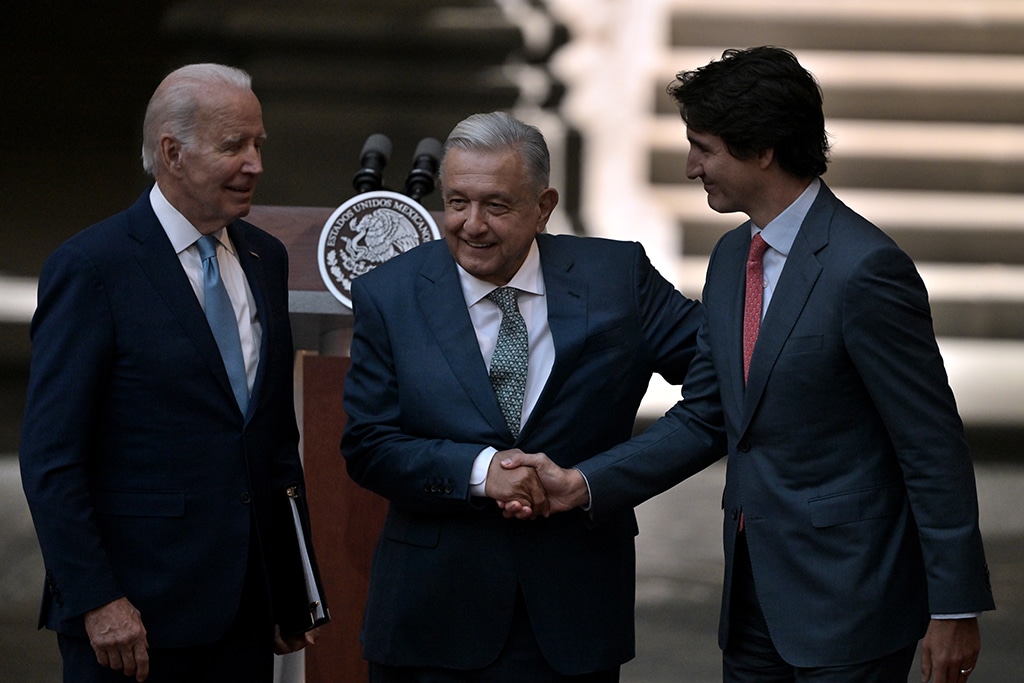MEXICO CITY: The leaders of the United States, Mexico and Canada pledged Tuesday to deepen regional economic integration and boost cooperation in clean energy, setting aside simmering trade tensions. Mexican President Andres Manuel Lopez Obrador welcomed his US counterpart Joe Biden and Canadian Prime Minister Justin Trudeau at the National Palace in Mexico City for what is known as the "Three Amigos" summit.
The three countries were working "to strengthen our cooperation on supply chains and critical minerals ... to build the technologies of tomorrow right here in North America," Biden said afterward. North America could become a "clean energy powerhouse" and a "global leader in addressing the climate crisis" through cooperation in areas such as electric vehicles, he added.
Trudeau said that the region had an "enormous opportunity" to boost its economic resilience by building a "clean economy." Biden revived the "Three Amigos" talks in 2021, seeking to restore normalcy to the three-way partnership after his predecessor Donald Trump shelved the regional summit.
But relations between Lopez Obrador and Biden have not been entirely smooth. Mexico faces a formal trade complaint from the United States and Canada under a North American trade deal. Washington and Ottawa say Lopez Obrador's push to boost the state's role in the energy industry hurts foreign investors and hinders the development of clean energy.
At their talks on Tuesday, however, the leaders put on a united front, emphasizing the potential for cooperation. Lopez Obrador said the countries had agreed to work on becoming "increasingly self-sufficient" by boosting regional trade to reduce their reliance on imports from other parts of the world.
Electric cars, semiconductors
The White House announced ahead of the summit that the three countries would organize "the first-ever trilateral semiconductor forum" to shape government policies and increase investment in supply chains. They will also expand resource mapping to gather details on minerals vital for clean energy technologies.
Biden said that strengthening regional supply chains would mean "that no one can arbitrarily hold us up or a pandemic in Asia cause us to not have access to critical elements that we need to do everything from build automobiles to so many other things." Other steps include drawing up a plan for operating standards and the installation of electric vehicle chargers along international borders and developing a North American clean hydrogen market.
On Monday signs of discord emerged between the United States and Mexico in their approaches to dealing with surging migrant arrivals at their shared border. At the start of bilateral talks, Lopez Obrador called for increased US investment, which should help stem migration.
"It is time to end this oblivion, this abandonment, this disdain for Latin America and the Caribbean," Lopez Obrador said. Biden defended Washington's record, saying it had spent "tens of billions of dollars" in the past 15 years alone that had benefited the region. "Unfortunately, our responsibility just doesn't end in the Western Hemisphere," he added.
Protest scuffles
Near the summit venue, police scuffled with protesters holding placards with slogans including "Migration is a human right" and "No more mass deportations." Amnesty International urged the North American leaders to make the rights of refugees and migrants a "top priority" at their talks and to "stop implementing inhuman shared migration policies."
"As the number of people fleeing violence and persecution continues to grow, protecting the human rights of migrants and refugees is of critical importance," said Erika Guevara-Rosas, Amnesty's Americas director.
Last week Biden announced an expansion of powers to expel people showing up at the border without clearance. At the same time, a legal, strictly enforced pathway will be created for up to 30,000 migrants a month from Cuba, Haiti, Nicaragua and Venezuela.
Another priority for Biden is tackling what he called "the plague of fentanyl," referring to the often-deadly opioid smuggled across the border by Mexican drug cartels. Biden and Trudeau also discussed the situation in Haiti, whose government has appealed for an international intervention force as armed gangs take over large swaths of the poverty-stricken Caribbean nation.
"The two leaders committed to continue coordination with partners on the UN Security Council on next steps to support stability to Haiti, including support to the Haitian National Police," a White House statement said. - AFP










